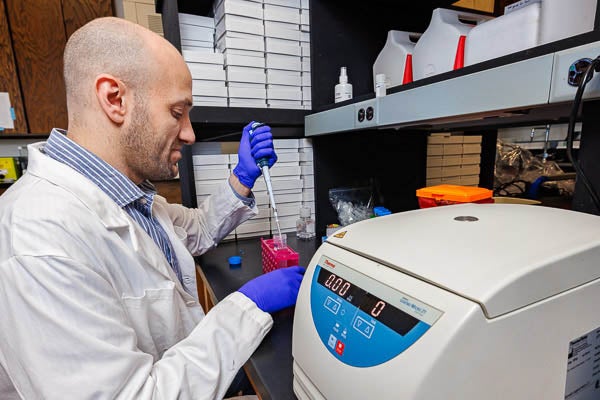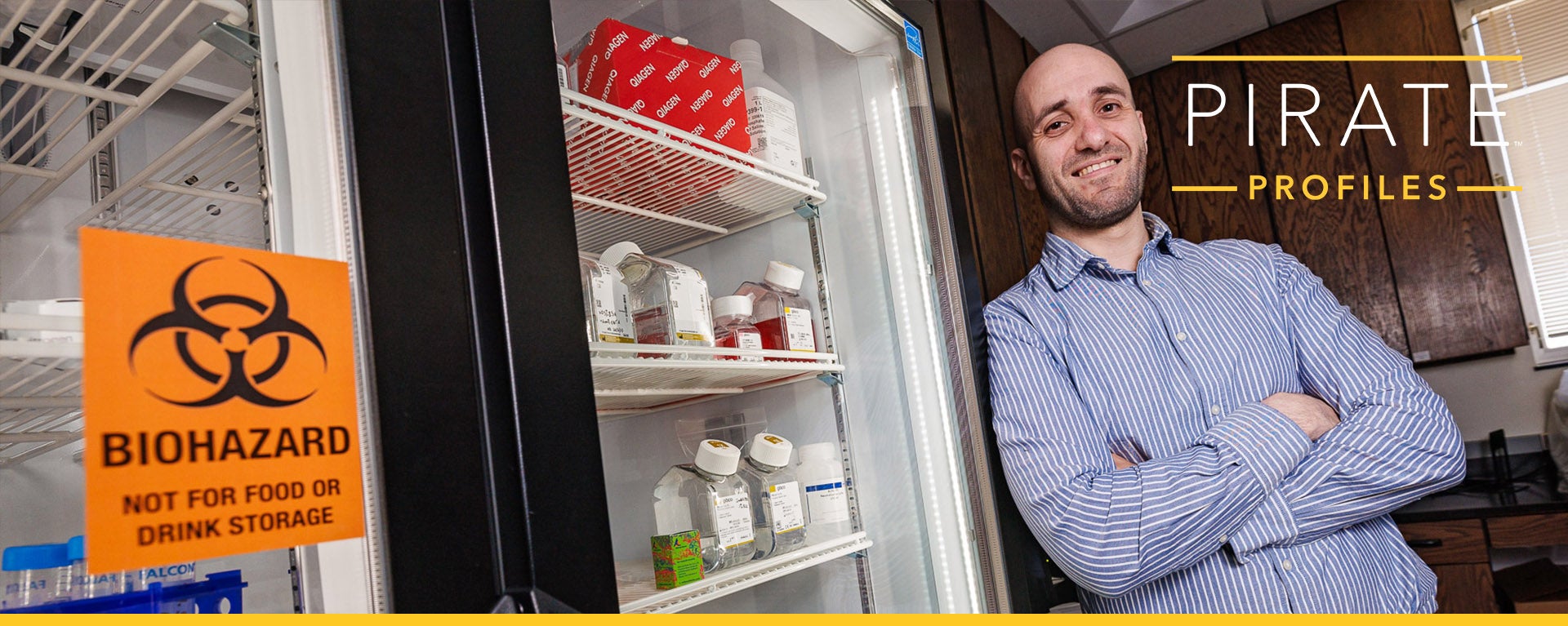Faculty: Alessandro Didonna
Alessandro Didonna learned a valuable lesson when he came to interview for a position at East Carolina University.
“We took off, got to Greenville, but because of a storm over Greenville, they didn’t let the plane land, and we flew back to Charlotte, and I stayed overnight in the airport,” said Didonna, an assistant professor in the Department of Anatomy and Cell Biology in the Brody School of Medicine. “I slept maybe an hour, and I had two full days of interviews, meeting all the faculty and giving a big seminar.
“It was really a challenge with very little sleep. So, my advice is never to take the last flight from Charlotte. I always take a flight in the afternoon in case something happens like that.”
It’s a long way from Didonna’s hometown of Rutigliano, Italy, to Greenville. But working at ECU is a natural progression of Didonna’s goals to teach young people and help unlock mysteries surrounding multiple sclerosis (MS), an unpredictable and debilitating disease that affects the central nervous system.
For Didonna, his curiosity as a child prompted his journey.

Alessandro Didonna works in his lab at the Brody School of Medicine. His current research focuses on understanding the role played by neuroinflammation in chronic neurological diseases.
“I was interested in wildlife and animals,” he said. “I had a lot of books about weird and unusual animals. … It’s like insects and reptiles, things that aren’t that common, things you find in the forest. As a kid, you want to see different shapes and different colors, so animals are like that.
“When I went to college and started taking classes, that’s when I discovered cell biology and neuroscience. I still enjoy animals and looking at wildlife, but I became really interested in molecular biology.”
While working on his doctorate in functional and structural genomics in Italy, he was mentored by Giuseppe Legname, a professor who had worked in the United States.
“For about five years, I listened to his stories about how good it was working in the U.S.” Didonna said. “That’s why I moved here. I was convinced by him saying that I should go.”
He had postdoctoral experiences at Northwestern University and at the University of California San Francisco, where he began to focus on MS under the leadership of Jorge Oksenberg.
“I had many projects with him, and we published many papers together,” Didonna said. “We had finished a really big project, and it had been six or seven years, and I thought it was time for me to become fully independent. That’s why I’m here right now. I wanted to run a lab, become a PI (principal investigator of research).”
Didonna is advancing his research as a 2022 recipient of the Wooten Family Initiative for Brain Health Research Grant. He hopes the research can identify a new therapeutic solution to MS progression and perhaps offer help with other diseases such as Alzheimer’s.
“Over the years, we have discovered that, not only MS but also other diseases such as Alzheimer’s, the focus was only on the brain,” Didonna said. “We found that also the immune system is involved, so we’re seeing all these different diseases are under the same umbrella. We see this immune system component is present in all of them. So now we are trying to make connections.”
While in San Francisco, he was among a team of MS researchers, but at ECU, his research is unique and provides him a chance to collaborate with those outside of his department.
“I enjoy starting from scratch, starting a new research line here and bringing my expertise here,” he said. “It’s exciting, and I enjoy building something new. That’s why I was excited to come here because you have the possibility to bring something new to a different place. It benefits the students to be exposed to new research, new methods and new models.”
And he relishes sharing those methods with the graduate students he teaches.
“I enjoy trying to explain complex concepts to students who are just starting their journey, trying to make the concepts simple,” he said. “It’s like doing research. You’re trying to deconstruct a complex biological problem. What we do in the lab, we try to do that in class. You have something that is very difficult, and you try to find the right words, the right slides, the right image to make it accessible to students who don’t have all of the background.”
Didonna received the Marilyn Hilton Award for Innovation in MS Research in 2017 and the Challenges in Progressive MS Award in 2021 from the International MS Alliance. He stays in close touch with his brother, José, a civil engineer in Italy, and he said he has found a few spots in Greenville where he can get a taste of his home country.
“I think here in Greenville there are good places to find Italian food,” he said. “I found a couple of places that make good pizza that I would say is on the same level as Italian pizza.”
FAST FACTS
Name: Alessandro Didonna
Titles: Assistant professor, Department of Anatomy and Cell Biology, Brody School of Medicine
Hometown: Rutigliano, Italy
Colleges attended and degrees: University of Bari, Bachelor and Master of Science in cell and molecular biology; International School for Advanced Studies, Ph.D. in functional and structural genomics
PIRATE PRIDE
Years working at ECU: Two
What I do at ECU: I do research in the Department of Anatomy and Cell Biology and teach courses for the graduate program in biomedical sciences.
What I love about ECU: I love the pride that all people on campus share to belong to ECU. From a research standpoint, I enjoy the collaborative environment and the possibility to build novel research lines with other faculty with diverse scientific interests.
Research interests: I have been trained in the field of neuroscience, and my current research interests focus on understanding the role played by neuroinflammation in chronic neurological diseases.
What advice do you give to students? Never be afraid to ask questions.
Favorite class to teach? Molecular and cellular biology
QUICK QUIZ
What do you like to do when not working? I enjoy reading, fishing and cooking.
Last thing I watched on TV: “Tribes of Europa”
First job: My first paid job was my postdoctoral position at Northwestern University.
Guilty pleasure: Prosecco wine
Favorite meal: Definitely my mom’s lasagna.
One thing most people don’t know about me: I am probably the only Italian who doesn’t drink coffee.
